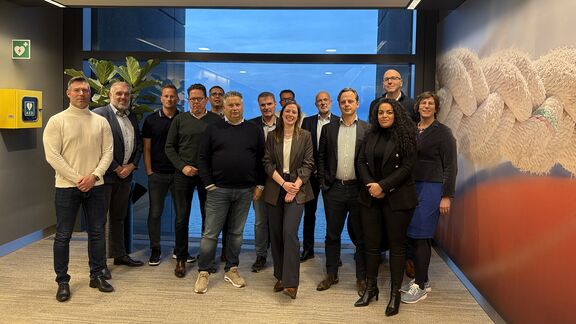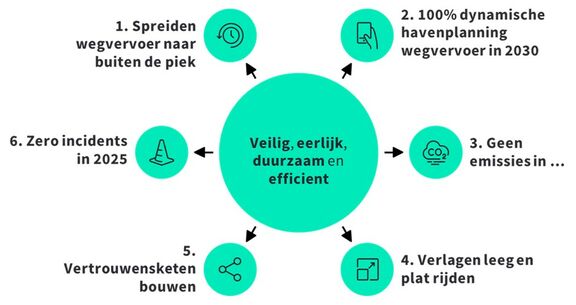Chain collaboration for sustainable and efficient container transport by road in the port of Rotterdam
Reading time: 3 minutes
The port of Rotterdam faces major challenges and opportunities arising from the expected growth in container volume to and from the port. One of those is efficiently handling road transport. The most important stakeholders have signed a declaration of intent to join forces in the ‘sector-wide negotiations for container transport by road’.
Within the sector-wide negotiations, the challenges are being tackled to improve traffic flow, safety and sustainability of road transport to strengthen the port of Rotterdam’s competitiveness. Such initiatives already existed for inland shipping and rail.

Joint vision and strategic focal points
The sector-wide negotiations on container transport by road actively work on creating the safest, fairest, most sustainable and efficient possible container logistics by road to contribute to the top position of Rotterdam and the Netherlands as the transport country in Europe.
The parties involved are convinced that a joint approach will be able to efficiently accommodate the expected growth in road transport to and from the port. This guarantees continued good operations to the hinterland, within the social preconditions related to safety and sustainability.
The parties focus on six strategic focal points:
- Spreading road transport; more transport outside peak hours
- Developing dynamic port planning
- Pursuing zero emission container transport by road
- Reducing trips with empty containers and no containers; improving the load factor of trucks
- Secure chain for safe port logistics
- Pursuing zero incidents for a safe road chain

Safe, fair, sustainable and efficient
- Spreading road transport to off-peak hours
- 100% dynamic port planning for road transport by 2030
- Pursuing zero emission container transport by road
- Reducing trips with empty and no containers
- Building a chain of trust
- Zero incidents in 2025
Active working groups and fact-finding research
The working groups, involving all participating parties, such as transporters, freight forwarders, shippers, terminals, depots, ship agents and the Port of Rotterdam Authority, develop and tackle the focal points. The working groups on the themes of sustainability and safety recently started.
Joint fact-finding research was conducted in parallel with these working groups’ activities. This research offers insight into the implications of the road product with growing container volumes and increasing autonomous developments. Furthermore, the research evaluates the added value of the strategic focal points before they are developed further in the working groups.
The sector-wide negotiations for container transport by road primarily focus on improving the road product in the port of Rotterdam. However, all parties aim for a dynamic and sustainable division of transport over all modalities (road, rail and inland shipping).